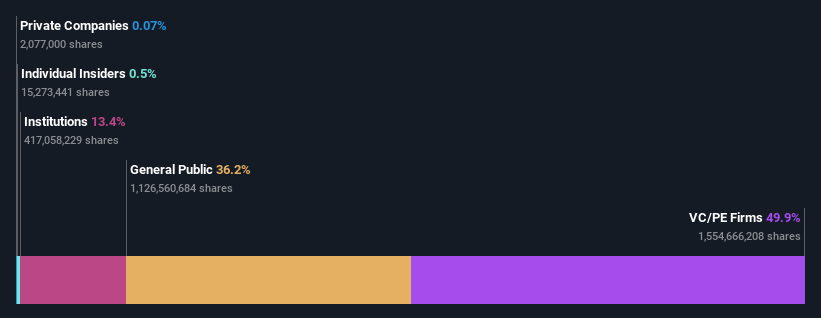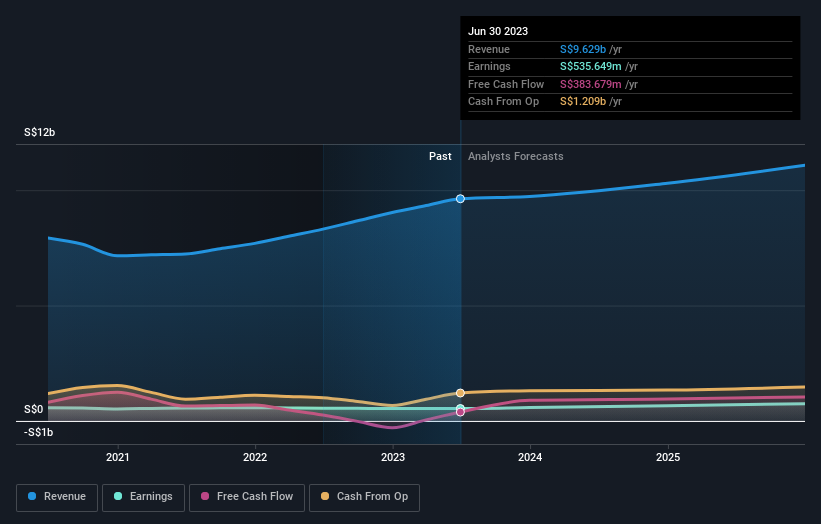- Singapore
- /
- Aerospace & Defense
- /
- SGX:S63
Singapore Technologies Engineering Ltd's (SGX:S63) largest shareholders are private equity firms who were rewarded as market cap surged S$405m last week
Key Insights
- Singapore Technologies Engineering's significant private equity firms ownership suggests that the key decisions are influenced by shareholders from the larger public
- 52% of the business is held by the top 2 shareholders
- 13% of Singapore Technologies Engineering is held by Institutions
To get a sense of who is truly in control of Singapore Technologies Engineering Ltd (SGX:S63), it is important to understand the ownership structure of the business. We can see that private equity firms own the lion's share in the company with 50% ownership. Put another way, the group faces the maximum upside potential (or downside risk).
Clearly, private equity firms benefitted the most after the company's market cap rose by S$405m last week.
Let's take a closer look to see what the different types of shareholders can tell us about Singapore Technologies Engineering.
Check out our latest analysis for Singapore Technologies Engineering

What Does The Institutional Ownership Tell Us About Singapore Technologies Engineering?
Institutions typically measure themselves against a benchmark when reporting to their own investors, so they often become more enthusiastic about a stock once it's included in a major index. We would expect most companies to have some institutions on the register, especially if they are growing.
Singapore Technologies Engineering already has institutions on the share registry. Indeed, they own a respectable stake in the company. This suggests some credibility amongst professional investors. But we can't rely on that fact alone since institutions make bad investments sometimes, just like everyone does. It is not uncommon to see a big share price drop if two large institutional investors try to sell out of a stock at the same time. So it is worth checking the past earnings trajectory of Singapore Technologies Engineering, (below). Of course, keep in mind that there are other factors to consider, too.

We note that hedge funds don't have a meaningful investment in Singapore Technologies Engineering. Temasek Holdings (Private) Limited is currently the company's largest shareholder with 50% of shares outstanding. The second and third largest shareholders are BlackRock, Inc. and The Vanguard Group, Inc., with an equal amount of shares to their name at 1.9%.
To make our study more interesting, we found that the top 2 shareholders have a majority ownership in the company, meaning that they are powerful enough to influence the decisions of the company.
Researching institutional ownership is a good way to gauge and filter a stock's expected performance. The same can be achieved by studying analyst sentiments. There are a reasonable number of analysts covering the stock, so it might be useful to find out their aggregate view on the future.
Insider Ownership Of Singapore Technologies Engineering
While the precise definition of an insider can be subjective, almost everyone considers board members to be insiders. Management ultimately answers to the board. However, it is not uncommon for managers to be executive board members, especially if they are a founder or the CEO.
Most consider insider ownership a positive because it can indicate the board is well aligned with other shareholders. However, on some occasions too much power is concentrated within this group.
Our data suggests that insiders own under 1% of Singapore Technologies Engineering Ltd in their own names. Being so large, we would not expect insiders to own a large proportion of the stock. Collectively, they own S$61m of stock. It is good to see board members owning shares, but it might be worth checking if those insiders have been buying.
General Public Ownership
The general public, who are usually individual investors, hold a 36% stake in Singapore Technologies Engineering. While this group can't necessarily call the shots, it can certainly have a real influence on how the company is run.
Private Equity Ownership
With a stake of 50%, private equity firms could influence the Singapore Technologies Engineering board. Some investors might be encouraged by this, since private equity are sometimes able to encourage strategies that help the market see the value in the company. Alternatively, those holders might be exiting the investment after taking it public.
Next Steps:
While it is well worth considering the different groups that own a company, there are other factors that are even more important. For instance, we've identified 2 warning signs for Singapore Technologies Engineering that you should be aware of.
If you would prefer discover what analysts are predicting in terms of future growth, do not miss this free report on analyst forecasts.
NB: Figures in this article are calculated using data from the last twelve months, which refer to the 12-month period ending on the last date of the month the financial statement is dated. This may not be consistent with full year annual report figures.
New: Manage All Your Stock Portfolios in One Place
We've created the ultimate portfolio companion for stock investors, and it's free.
• Connect an unlimited number of Portfolios and see your total in one currency
• Be alerted to new Warning Signs or Risks via email or mobile
• Track the Fair Value of your stocks
Have feedback on this article? Concerned about the content? Get in touch with us directly. Alternatively, email editorial-team (at) simplywallst.com.
This article by Simply Wall St is general in nature. We provide commentary based on historical data and analyst forecasts only using an unbiased methodology and our articles are not intended to be financial advice. It does not constitute a recommendation to buy or sell any stock, and does not take account of your objectives, or your financial situation. We aim to bring you long-term focused analysis driven by fundamental data. Note that our analysis may not factor in the latest price-sensitive company announcements or qualitative material. Simply Wall St has no position in any stocks mentioned.
About SGX:S63
Singapore Technologies Engineering
Operates as a technology, defence, and engineering company worldwide.
Solid track record with reasonable growth potential and pays a dividend.
Similar Companies
Market Insights
Community Narratives




